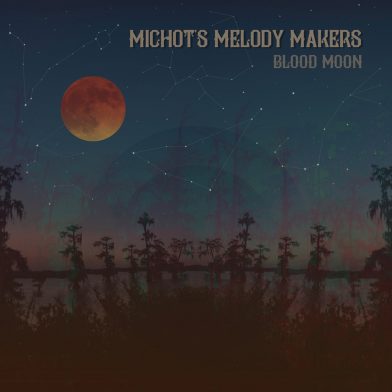 Not since the madmen of Fat Possum Records got Tom Rothrock (engineer of Beck’s early recordings) to remix R.L. Burnside’s Hill Country blues-drone on Come On In has someone so successfully taken a roots music tradition and updated it as Louis Michot and Korey Richey have with Cajun music. Their records with the Lost Bayou Ramblers and now Blood Moon with Michot’s Melody Makers have taken Cajun waltzes and two-steps into the worlds of hip-hop, electronic dance music, and others without losing the essence of what make them unique. This is not tu grand-mere’s Cajun music, but it might be tu mere’s (especially si tu mere est hip). Michot and Richey use effects and mixing to change the sound of the instruments so that they don’t necessarily sound like that to which your ear is accustomed. Notes from the violins hang in space and then slowly fade, or they stab and pierce in a way that lets them cut through the electrics and noise of the world around them. Bass guitars thump and spring like a trampoline.
Not since the madmen of Fat Possum Records got Tom Rothrock (engineer of Beck’s early recordings) to remix R.L. Burnside’s Hill Country blues-drone on Come On In has someone so successfully taken a roots music tradition and updated it as Louis Michot and Korey Richey have with Cajun music. Their records with the Lost Bayou Ramblers and now Blood Moon with Michot’s Melody Makers have taken Cajun waltzes and two-steps into the worlds of hip-hop, electronic dance music, and others without losing the essence of what make them unique. This is not tu grand-mere’s Cajun music, but it might be tu mere’s (especially si tu mere est hip). Michot and Richey use effects and mixing to change the sound of the instruments so that they don’t necessarily sound like that to which your ear is accustomed. Notes from the violins hang in space and then slowly fade, or they stab and pierce in a way that lets them cut through the electrics and noise of the world around them. Bass guitars thump and spring like a trampoline.
On songs like the punk “Allons Tous Boire Un Coup” they race along at a breakneck pace akin to downing a cocktail all in one sip. Another great way they do this appears in “La Lune Est Croche.” Here, the way the drums, fiddle and t-fer are mixed as they repeat, it sounds like the band is sampling Cajun music the way hip-hop artists do. These effects, when combined with the passion of the musicians here, can take songs we all know and let us hear them anew. Michot’s Melody Makers’ version of “Dans Les Pins,” with its haunted soundscape and Michot’s pained howls, gives this oft-covered standard a palpable fear and anguish. It is easily one of the eeriest versions since Nirvana closed out their Unplugged record with the song and gave us insight into Kurt Cobain’s psyche. When the drums come in mixed like they exist in 2018 instead of 1958, they make even the more traditional songs like “Blues de Neg Francais” sound contemporary. And this music is contemporary.
Having grown up in this tradition, Michot’s Melody Makers do not make the mistake of treating this and other traditional music as many roots music fetish-obsessives do: a fragile, precious time capsule. Their comrades-in-music to the East, the Preservation Hall Jazz Band, possess the same aesthetic. Both bands show that artistic and commercial success can come from attempting to contemporize old music if you do it with the right mixture of care and abandon. Cajun music is hardy and strong enough to withstand these types of changes. In fact, it might even turn on listeners who might not get into it when it is presented as old-timey music. And that would be great for the Cajun nation and all of us who admire the music it created.




